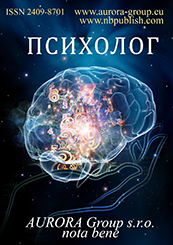Developmental psychology
Reference:
Aktayeva, A.A. (2025). Integration of neurophysiological mechanisms of attention and emotional regulation in the "Reality Strategy" method: empirical justification for accelerated therapy of psychological trauma. Psychologist, 5, 1–20. . https://doi.org/10.25136/2409-8701.2025.5.75715
Abstract:
The subject of the study is the integration of neurophysiological mechanisms of the reticular activating system (RAS) and emotional regulation within the framework of the innovative method "Reality Strategy," developed for accelerated therapy of psychological trauma. The object of study is the psyche as a dynamic self-organizing system prone to fragmentation under conditions of global crises, where emotional intelligence (EI) plays a key role as a catalyst for reconsolidation. The author analyzes the role of RAS in selective attention filtering and its dysfunction when fixating on traumatic narratives. As a central instrument of correction, a multi-level "Acceptance" is considered, providing recalibration of neural filters through practices based on principles of predictive coding of the brain. Empirical data (N = 60) confirm high effectiveness: a sharp reduction in emotional charge of traumas (from 9.5 to 1.8 points) is observed, statistically significant growth in EI indicators (p < 0.001), and sustainable improvement of neurophysiological markers of attention. The method is positioned as precision psychotherapy and introduces the concept of "neuroauthenticity" for deep personal transformation and prevention of disorders in high-risk groups. The method and methodology feature a longitudinal design with pre-, mid-, and post-measurements, tools including MSCEIT, HADS, PCL-5, and qualitative analysis of vignettes to assess neuroplasticity and emotional regulation. The novelty of the research lies in the operationalization of multi-level "Acceptance" as a tool for reprogramming RAS to focus on resource narratives, accelerating healing. The main results of the conducted research provide convincing confirmation of the therapeutic effectiveness of the proposed method, demonstrated by statistically significant improvements in the participants' condition, including a 30-40% reduction in anxiety and depression symptoms on the HADS and PCL-5 scales. These data indicate a high potential for scaling the method at a global level, especially in the acute post-pandemic mental health crisis, where demand for innovative treatment approaches is growing. The authors emphasize the need for further research using randomized controlled trials (RCTs) and neuroimaging methods such as fMRI for deeper validation and understanding of the mechanisms of action at the brain level. An important scientific contribution of this study is the introduction of the concept of "neuroauthenticity," which enhances the effectiveness of therapeutic intervention and strengthens preventive measures for the quality of life of patients.
Keywords:
neuroauthenticity, precision psychotherapy, predictive coding, reticular activating system, acceptance, emotional intelligence, psychological trauma, neurophysiology of attention, reality strategy, emotional regulation
 This work is licensed under a Creative Commons Attribution-NonCommercial 4.0 International License.
This work is licensed under a Creative Commons Attribution-NonCommercial 4.0 International License.
 Eng
Eng












 © 1998 – 2025 Nota Bene. Publishing Technologies. NB-Media Ltd.
© 1998 – 2025 Nota Bene. Publishing Technologies. NB-Media Ltd.




